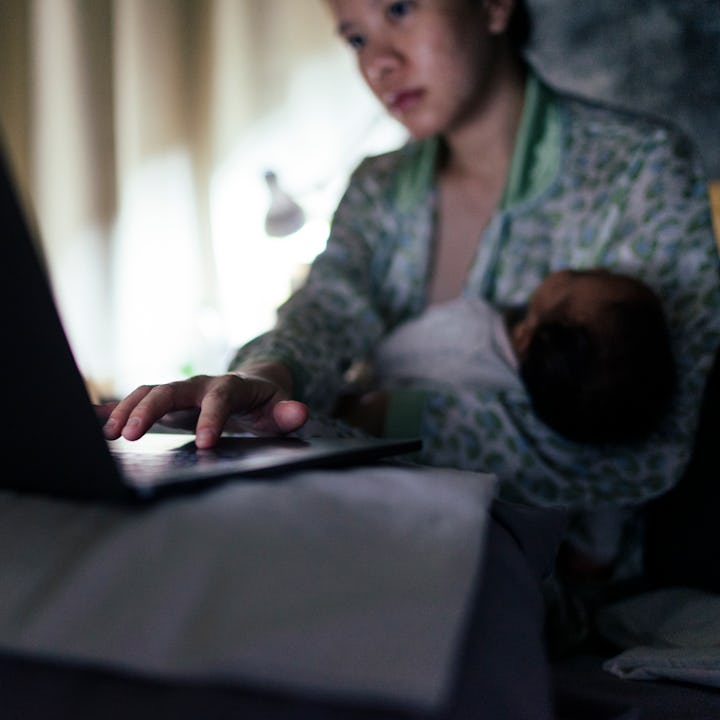Study Shows That Universal Paid Family Leave Would Literally Change Infant Brains
Researchers found that the EEGs of infants whose mothers received three months of paid leave had more complex brain wave patterns.

Last fall, Democrats attempted to create a national paid leave program called the Build Back Better Act, which was designed to guarantee paid family and sick leave to Americans.
Ultimately, the bill did not pass the Senate and was shelved, leaving the U.S. as one of six countries in the world that does not have guaranteed paid leave for new mothers. It’s a policy (or lack of policy) that leaves many working moms in a difficult position, especially those who do not necessarily have the financial wiggle room to take unpaid time off to bond with their newborn during critical months of development, not to mention moms who can’t take that much time off at all without losing their job.
A new study by NYU Steinhardt Assistant Professor Natalie Brito gives data-backed credence to the benefits of universal paid family leave — for both families and kids. The study, recently published in peer-reviewed journal Child Development, found that infants with increased activity of higher-frequency brain waves were 7.39 times more likely to have mothers with paid leave.
Researchers looked at a diverse sample of EEG readings of infants from families in New York City over the course of three months. Then the research team asked parents to complete a perceived stress scale, which included questions about their work and paid leave situations. They also collected hair samples to test for levels of cortisol, aka a hormone released when we are stressed.
The data collected showed a correlation between lower levels of stress associated with paid leave and “distinct EEG profiles, possibly reflecting more mature patterns of brain activity.”
In English, this means that infants whose moms had the option of paid leave tended to have EEG levels that were more complex and further developed than the infants whose mothers did not.
“The first few months of life are so important for brain development because neural connections in the infant brain are emerging in the context of warm, predictable, and responsive social interactions between the parent and infant,” Brito explained in an interview with NYU News.
This isn’t to shame any mom who chooses to return to work early after having a baby. More than anything, Brito’s research shows how much the impact of parental stress has on an infant’s brain development, and unfortunately, that often comes from financial insecurity.
“This brain plasticity makes it easier for infants to learn about the world around them, but this plasticity also makes the brain much more susceptible to negative experiences like parental stress,” Brito continued.
This can include stress caused by having to work long hours on top of the massive amount of stress and change that comes with the first few months post-childbirth.
“Currently, only 23% of all employed workers in the US have access to paid parental leave through their employers,” Brito told NYU News. Brito also noted that more vulnerable populations are often the ones most harmed by the lack of unavailable paid leave.
“Black mothers, single mothers, and mothers with lower levels of education have significantly less access to both paid and unpaid leave. Parents who do not have access to paid leave are more likely to return to work too early after childbirth—one report estimated that almost a quarter of mothers who did not have access to paid leave returned to work within 10 days of giving birth,” Brito noted.
Brito also noted that paid leave shouldn’t just go out to mothers, but to caregivers in general, including fathers. Again, this goes to show that it is not just that a mother needs to be home with an infant to ensure their brains are wired for happiness and success; what is necessary is a caregiver who is not weighed down by massive stressors like how they are going to make ends meet.
“Paternity leave has also been shown to positively impact relationships within families, and that increased time between fathers and infants may help attune fathers to the needs of their infants and partners,” he said.
This article was originally published on